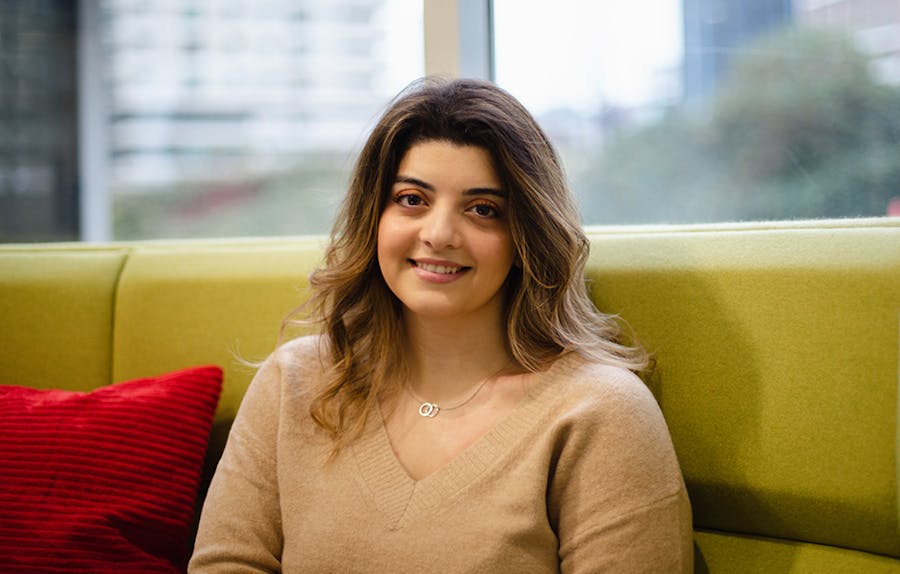
MELISA OLESCHUK
International Human Rights PhD
Passionate about the empowerment of people and the protection of human rights, Melissa felt studying a PhD would provide her with the knowledge for a career contributing to a better society. After completing her undergraduate degree in Law and postgraduate degree in International Human Rights, she is now studying for her PhD, exploring the translation of international human rights provisions into domestic legal change.
“I always wanted to study a PhD. In fact, in my first seminar for criminal law, I remember vividly telling my now supervisor, Dr Alice Storey, that I wished to do a PhD when I finished my degree. I chose BCU because I knew it was where I would find the most enabling environment for my career goals and that I had found the best research team for me. Researchers here have achieved many wonderful things and speak with knowledge and wisdom.
I chose to study a postgraduate degree, first and foremost, because I love to learn. Secondly, I am an immigrant. I felt I had to make my parents’ sacrifice and hardship to settle within the UK “worth it”. I felt establishing myself with a PhD would provide me with the understanding, skillset, and experience for a career where I can focus on improving society, empowering people, and protecting human rights.
My immigration status played a significant role in my educational journey. It posed financial issues for me, which I worried would hinder my access to higher education, particularly whilst I held limited leave to remain status. I am immensely thankful for the support I received from BCU, and the opportunity to pursue higher education. As a result, addressing the systemic gaps in institutional policies that often overlook students in situations like mine has become a career objective of mine. The experience of navigating these challenges is undeniably harsh, but I am grateful that BCU is an exceptionally diverse institution where my case was far from unique.
Being a working-class immigrant woman in the field of law, I've encountered my fair share of barriers that, regrettably, persist in our society. I'm incredibly proud to say I have never faced these obstacles at BCU. Not only did BCU empower me, but it also provided me with invaluable opportunities to overcome these challenges. As a Ukrainian citizen, the onset of the war in Ukraine coincided with the early stages of my PhD journey which, of course, complicated things for me. On the day the war began, I was moved by the outpouring of support, calls and messages from BCU staff offering help. I will forever cherish and be grateful for their kindness.
My area of research ties directly with my commitment to free speech and empowerment of civil society, and desire to influence law and policy. I believe human rights are too often impacted by politics and wish to change this.
BCU has always presented me lots of inspiring opportunities to enrich my CV. For example, in my third year of my undergraduate Law degree, I was invited to join Dr Alice Story on a trip to Brazil, where we would deliver presentations on the Universal Periodic Review. In June, I have plans to visit Denver, joining members of the Centre for American Legal Studies as they host a roundtable on civil social engagement. This is a prestigious conference – the LSA 2024 – hosting academics and professionals from around the globe. Excitingly, my supervisors at BCU have also presented me with lots of opportunities to co-author publications and work on huge projects, including: The Domestic Violence Case-note, The CSO and UPR project, and That’s Me! Research Project.
That’s Me! Eliminating Boundaries to Postgraduate Research Study
My supervisors, the BCU Doctoral Research College and my funding body (Midlands4Cities) have been integral in helping me access some amazing career building opportunities. This included attending the Geneva Academy Executive Training Course on the Universal Periodic Review in Geneva, Switzerland, and being selected for the incredibly competitive and prestigious United Nations Graduate Study Programme.
There are lots of ways to integrate within the BCU community. For me, during my undergraduate degree, this involved immersing myself in student societies and ambassador programmes. I had the honour of being chosen by the Law Society at BCU to discuss my experiences as a woman in the legal field and contributing to discussions on student mental health with the BBC. In my Master’s, I served on the committee for the BCU Women’s Society – which empowered me to engage with intersectionality at the university.
After my PhD, I plan to focus on developing myself as an academic, hopefully at BCU. After that, I would like to go into industry and work with non-governmental or civil society organisations to support and empower their advocacy efforts. Longer term, I would like to complete the UK FCDO fast streamers programme, to train to become a diplomat. Then, who knows, maybe I will put myself forward for ambassadorship or maybe the United Nations Secretary General! Ultimately, I want to place myself in the best position to protect human rights globally.
BCU is a dynamic atmosphere where I can engage with innovative research, collaborate with experts in my field, and immerse myself in law and human rights. The faculty and fellow research students encourage me to explore new perspectives and challenge my assumptions, broadening my thoughts and developing my critical thinking.
To me, 'I am BCU' symbolises my capacity to achieve remarkable accomplishments. I am indebted to the exceptional opportunities at BCU, for which I am eternally thankful.”